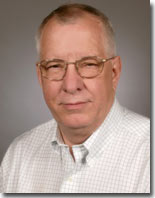Microsoft Big Brains: Burton Smith

Just before retiring from day-to-day responsibilities at Microsoft, Chairman Bill Gates said that he expected Microsoft's 22 Technical Fellows to get a lot more publicly visible -- now that they wouldn't be living in his shadow. While some of the Microsoft fellows already have been active on the public-speaking circuit, many of them are not widely known outside the company.
Last year I launched this series -- "Microsoft Big Brains" -- to help remedy that shortcoming. In the coming weeks, I am hoping to profile as many of the company's tech fellows as to whom I can get access.
Microsoft's Technical Fellows came to the company via a variety of different routes. Some of them run divisions inside the company; some focus on particularly thorny technical issues that may span a variety of product units. Regardless of where they sit in the organization, the fellows all have been charged with helping Microsoft craft its next-gen products and strategies, much the way that Gates used his regular "Think Weeks" to prioritize what Microsoft needed to do next.

Microsoft currently has many efforts across the company -- in product groups, research and incubation labs -- that are focused on making programming and operating parallel and multicore systems easier. It wasn't long ago, however, that Microsoft was on the sidelines in the many core/multicore space.
"Back when I joined Microsoft (in 2006), some (Softies) said we should just tell AMD and Intel to stop doing this" (move to multicore architectures) Technical Fellow Burton Smith recalled.
One of Smith's first charters, when he was hired by Microsoft Chief Research and Strategy Officer Craig Mundie, was to evangelize the importance of adapting to parallel/multicore planning and thinking across the entire company.
"I talk to people a lot across the company and try to convince them what the right thing to do is, in terms of making parallel computing a success," Smith said. And he isn't talking just about in high-performance servers; he also is focused on what this shift in architecture will mean in client systems (like Windows 7), mobile phones and distributed services.
In all of these cases, it's important to architect software so that it allows work to be done on the right platform and/or in the right moment to take advantages of the advances that parallelism brings. But Microsoft's biggest challenge here is its substantial installed base in both operating systems and tools, Smith said.
"We are a canonical software platform. The really tough problem is legacy and how to replace it with something else," he acknowledged. (Burton didn't mention Microsoft's next-generation MIdori project here, but I'd bet that's one of the areas he was thinking of when he made this comment....)
Unlike some of the other Microsoft Technical Fellows, Smith isn't assigned to one particular team or group. He is focused on working with individuals, rather than on specific products, he said.
"I'm interested in anything in the parallel computing arena," he explained. "I generate a fair number of ideas per day and have a tremendous memory. I know what's out there" in the parallel-computing universe.
Smith admitted that Microsoft still has a long road ahead, even though it has introduced some rudimentary tools and is planning to deliver more parallel-processing support via tools like Visual Studio 2010 (expected to ship before the end of calendar 2009).
"Internally, we are leading. In the marketplace, we are not. We have parity" with where other companies are, in terms of their support for parallelism and multi-core, he contended. "But a lot of people are counting on us. And we have (products and technologies) that will help advance things along."
For all of the “Microsoft Big Brains” profiles, check out the Big Brains page.